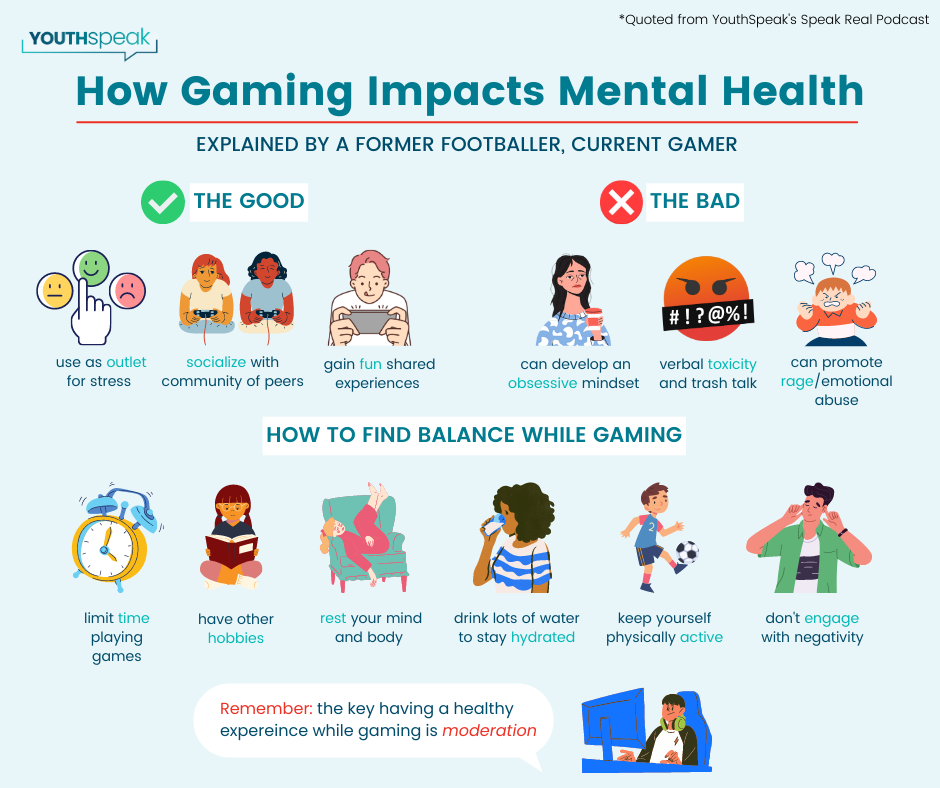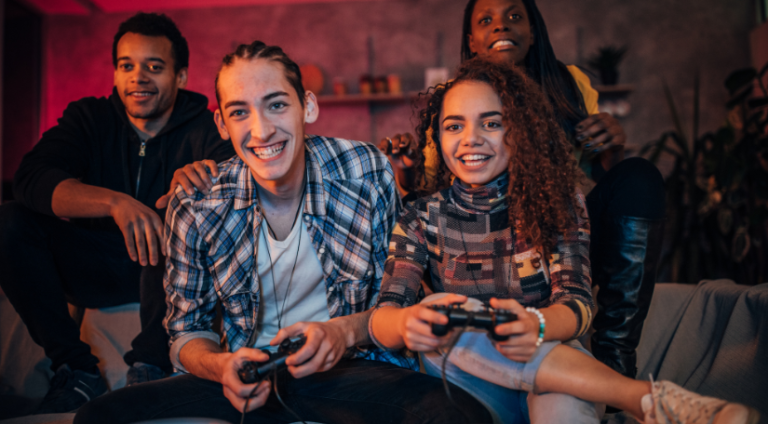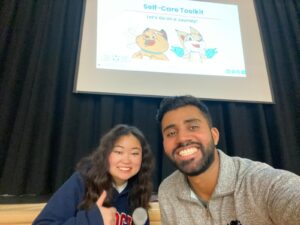On this episode of our Speak Real podcast, Christian is joined by Dave Matthew Boddy, an e-sports gamer, mentor, and former football player who now coaches NFL Flag. Together, they discuss the effects of gaming, good and bad, on youth mental health and the importance of self-awareness and thinking critically about your reasons for gaming. For Dave, esports are a hobby that he became involved in during the pandemic. When he competes, it’s primarily with a game called Madden. He says,
“Gaming has always been that outlet for me of therapy and just feeling as if I belong somewhere because growing up as a gamer, a lot of people may notice that you are often laughed upon or mocked or made fun of or told to go touch grass. However, the truth of the matter is we all have a little bit of a gamer inside of us. Let’s be honest, we all love those moments when we can sit down and distract ourselves from the real world for a bit.”
Along with being a gamer, Dave is a Concussion Legacy Foundation Champion for Unsinkable Foundation in Canada and a mental health advocate. He has previous professional experience as a youth mentor, security professional, and pro-wrestler. He has also been diagnosed with ADHD, OCD, and misophonia, a condition that makes certain repeated sounds, like chewing with one’s mouth open, intolerable. Dave’s personal journey with his diagnoses encouraged a deeper understanding of mental health, specifically ADHD.
“One of the most common misconceptions about ADHD is that we can’t focus but let me tell you, we can if we are passionate about something. It’s called hyper-focused for a reason. We become so hyper-fixated and so passionate to the point where it can be borderline annoying for neuro-typical people.”
Dave is passionate about concussion awareness because he sustained fifteen concussions and numerous hits to the head between the ages of five to twenty-five. He went so far as to pledge his brain for research because his ADHD diagnosis was a negative experience. He explains that “there was no game plan,” which meant that he was left to understand his mental illness on his own. At the time, there was a lack of research that prevented him from receiving proper care for his concussions. He suffered what is known as second-impact syndrome, a hit to the head in the same area as a previous concussion that did not have time or conditions to heal. The consequence of this can be fatal, which is why it’s important to receive proper medical attention after experiencing an injury. Thankfully, Dave survived and focused his attention on mental health in gaming.
While gaming can be a source of entertainment, streaming can make it stressful because the focus shifts from enjoyment to alleviating social pressures. Christian and Dave mention different ways social pressure can have an adverse effect on mental health:
- Pressure to be engaging
- Increased anxiety
- Self-consciousness about technology
- Narrowing focus on view count
- Trolls in the comment section
- The role of a gamer gets confused with the role of an entertainer
Dave says,
“The most important part of any journey that you are on is self-awareness and just being honest with yourself…, ‘Why am I doing this? Am I doing it for clout? Am I doing it for a sense of I need to belong somewhere? You have to ask yourself, why am I streaming?’”

There are wrong reasons to stream; specifically, attention and wanting to fit in with successful streamers. Doing anything strictly for attention is not something Dave advises because passion for the game is then replaced with trying to fit within a streaming social hierarchy. Rather than enjoying the game for itself, there becomes undue pressure to entertain and one-up others. It turns the experience of playing a game into a popularity contest. For this reason, self-awareness is important, especially while streaming, because it keeps gaming rooted in personal enjoyment and offers therapeutic benefits.
Dave instructs youth,
“Never do something to build confidence because it’s going to be so difficult if that’s your main intent in doing it, where it’s like, ‘I’m lacking confidence. I’m going to go stream.’ What’s going to happen is you’re going to put so much pressure on yourself to increase your confidence that it’s going to be counterproductive. You’re going to create anxiety.”
Streaming is not all negative. It can be helpful for community building and improving gaming skills. However, Dave does point out a distinction between wanting to fit in and belonging somewhere. He explains that wanting to fit in can become toxic when it requires you to change who you are to satisfy community members. Whereas, belonging somewhere is being accepted for who you are without needing to make unnecessary concessions or sacrifice personal convictions. Gaming should be about having fun and expressing your personality, not strictly for competitive reasons. It is that sense of competition that can inspire, motivate, and encourage, but it can also diminish your self-worth because streaming becomes a way to compare and trash-talk instead of enjoying the game.
“Normal trash-talking is, ‘Oh, you could’ve caught that,’ but when you’re dropping swears and name-calling and other very inappropriate vocabulary, wow. That’s something I love to speak about in regard to podcasting or appearances I do: the reality of toxicity in gaming and how its competitive nature comes in and it makes people so toxic because they’re trying to get that leverage over you. They’re trying to mentally beat you down.”
The reality is, gaming professionally is stressful. In esports, the average age of retirement is 25 because of its draining effects on mental health. Dave is careful to mention that he is not trying to scare youth away from gaming, but to emphasize the importance of self-awareness and developing healthy personal habits.
“Don’t focus on the grand prize. Don’t focus on the cash you can win. If that’s the only reason why you’re going to do it, it’s going to be a miserable experience for you. You have to love it. You have to have the passion for it.”
Christian and Dave list factors that make e-sports difficult:
- Dealing with toxicity from both self and others
- Admonishment from others that gaming is a waste of time
- Not paying attention to one’s physical well-being
In order to deal with these triggers, it’s important for youth to develop proper coping strategies. First, it is recommended to play games because one has a genuine passion for it. Second, it’s necessary to establish a routine that takes mental, physical, and emotional well-being into consideration. This involves developing healthy eating habits, controlling one’s intake of energy drinks, and monitoring one’s gaming use. Dave mentions an app called FITGMR that “helps you keep track and hold yourself accountable for your daily routine, such as meditation, physical exercise, reading, and nutrition.” Dave offers a few healthy strategies of his own:
- Pour a bowl of dry cereal during gaming sessions
- Use loading screens as an opportunity to perform a stretching exercise or go for a walk
- Drink water throughout the day
- Limit your consumption of energy drinks to one serving
- Make sure to complete chores and daily tasks before a gaming session
- Use social media platforms, like TikTok and Instagram, to find stretching exercises and gaming tips
Gamers who are interested in going pro need to train their mind and body with non-gaming activities to stay healthy and improve their odds of success.
“You’re not going to see Tom Brady on the football field for 17 hours throwing a football.”
Moderation is key. While both Christian and Dave enjoy consuming soft drinks, slurpees, and energy drinks, they also recognize the importance of control. A key aspect of developing control is understanding the effects that sugar and caffeine have on the body. According to Dave, these drinks need to be treated “as a reward, not like an addiction where it is a need.” Excessive intake can lead to health issues, such as diabetes or increased anxiety.
“We need a lot more focus to be on nutrition, a lot more focus to be on mental health, a lot more focus to be on productive training and not just game war.”
Dave asked his 14 year old son, who also plays games, “what advice have you heard?” To Dave’s dismay, his son replied, “ that raging is normal.” There is a false narrative being expressed to youth that toxic behaviour should be excused because it is entertaining.
“It’s so easy to trash-talk on a microphone but I promise you, I guarantee you, if you’re face-to-face with the person, your energy will be on a different level.”
Building a healthy gaming community involves self-awareness and learning how to communicate in productive, helpful ways. While competition provides a helpful gaming edge, caring for your mental health means acknowledging why you game and what you intend to gain from the experience.
“I feel a lot of gamers now have the passion for being a champion but not necessarily for the journey it’s going to take to get there. And that’s why a lot of them drop off. They say, ‘You know what, I’m done.’ It’s because they were chasing the wrong thing. They weren’t chasing passion. It’s all about passion.”
As this conversation comes to an end, Dave offers a list of helpful people and resources for esport gamers:
- 1-HP, a group of medical professionals devoted to healthy gaming practices
- FITGMR, an app that allows you to maximize your gaming potential by monitoring and analysing your physical activity and gaming patterns
- Hero Trainer, an app that monitors physical health and offers incentives in the form of points that can be cashed in for games
- Dr. Jordan Tsai, a physical therapist for esports gamers
- Secretlab, a company that builds gaming-specific chairs
- Safe In Our World, an organization that specializes in mental health in gaming
Watch the full episode here:
YouthSpeak is a charity organization based in the GTA, Canada that conducts assemblies and interactive workshops to help increase the resiliency of youth facing challenges today. To find out more about our projects and initiatives visit https://youthspeak.ca/. Follow our journey on social media @youthspeakCAN Help support our For-Youth-by-Youth projects by donating at: https://www.canadahelps.org/en/pages/i-support-youthspeak/






